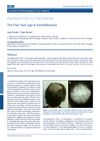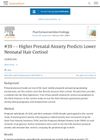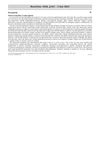 1 citations,
October 2022 in “Sci”
1 citations,
October 2022 in “Sci” Helmets used in acupuncture and light therapy can affect brain blood flow, hair growth, and may improve brain diseases and cognitive functions.
 1 citations,
January 2003 in “Expert Opinion on Therapeutic Patents”
1 citations,
January 2003 in “Expert Opinion on Therapeutic Patents” Steroid sulfatase inhibitors could potentially treat hormone-related disorders like certain cancers, hair loss, acne, and improve cognitive dysfunction.
 451 citations,
March 2005 in “Endocrine Reviews”
451 citations,
March 2005 in “Endocrine Reviews” The enzyme steroid sulfatase is linked to breast cancer and other conditions, and inhibitors are being developed for treatment.
 138 citations,
March 2001 in “Clinics in Dermatology”
138 citations,
March 2001 in “Clinics in Dermatology” Hair loss can significantly affect a person's self-esteem and body image, especially in young people, those who value their looks highly, and women.
 50 citations,
September 2016 in “The Journal of Clinical Endocrinology and Metabolism”
50 citations,
September 2016 in “The Journal of Clinical Endocrinology and Metabolism” Finasteride for hair loss may cause persistent sexual symptoms, depression, anxiety, and lower quality of life.
 17 citations,
September 2020 in “Journal of Endocrinological Investigation”
17 citations,
September 2020 in “Journal of Endocrinological Investigation” Post-finasteride patients show changes in gut bacteria, possibly causing various symptoms.
 13 citations,
June 2012 in “Journal of Dermatological Case Reports”
13 citations,
June 2012 in “Journal of Dermatological Case Reports” An 8-year-old boy with hair-pulling disorder had a bald patch that was confirmed not to be a fungal infection and was treated with therapy.
 8 citations,
September 2021 in “Skin appendage disorders”
8 citations,
September 2021 in “Skin appendage disorders” Trichotillomania treatment is most successful with a mix of behavioral therapy, medication, and social support.
5 citations,
May 2015 in “JRSM open” If a child is losing a lot of eyelashes and it keeps happening, doctors should look carefully at their health history because it might be a sign of a different health problem.
 4 citations,
January 2019 in “Clinical and Experimental Dermatology”
4 citations,
January 2019 in “Clinical and Experimental Dermatology” The review found that individualized treatment and teamwork are important for trichotillomania, and patients who followed through with treatment often improved.
 3 citations,
March 2019 in “Post Reproductive Health”
3 citations,
March 2019 in “Post Reproductive Health” Testosterone replacement can help menopausal women with various symptoms, but should be used carefully and is not yet officially licensed in the UK for women.
 3 citations,
December 2001 in “Irish Journal of Psychological Medicine”
3 citations,
December 2001 in “Irish Journal of Psychological Medicine” Trichotillomania is a challenging-to-treat impulse-control disorder where individuals pull out their hair, more common in females, with some treatments showing benefits.
 2 citations,
June 2016 in “PubMed”
2 citations,
June 2016 in “PubMed” An 11-year-old girl with compulsive hair pulling was successfully treated with therapy and medication.
 2 citations,
July 2005 in “Baylor University Medical Center Proceedings”
2 citations,
July 2005 in “Baylor University Medical Center Proceedings” A 4-year-old girl was diagnosed with trichotillomania, a condition where she pulls out her hair, which may resolve on its own or require therapy.
 1 citations,
May 2016 in “Current Opinion in Pediatrics”
1 citations,
May 2016 in “Current Opinion in Pediatrics” Children's hair loss can be caused by various factors and should be treated with appropriate, age-specific methods and psychological support.
 1 citations,
December 2014 in “Klinik Psikofarmakoloji Bülteni-Bulletin of Clinical Psychopharmacology”
1 citations,
December 2014 in “Klinik Psikofarmakoloji Bülteni-Bulletin of Clinical Psychopharmacology” Adding aripiprazole to the treatment improved hair-pulling symptoms in a teenager.
November 2024 in “Actas Dermo-Sifiliográficas” N-acetylcysteine and memantine are recommended as safe and effective treatments for trichotillomania.
 February 2024 in “Psychoneuroendocrinology”
February 2024 in “Psychoneuroendocrinology” Higher prenatal anxiety is linked to lower cortisol levels in newborns' hair.
 December 2023 in “Current psychosomatic research”
December 2023 in “Current psychosomatic research” Psychological interventions can improve the quality of life for women with PCOS.
 April 2023 in “JMIR Research Protocols”
April 2023 in “JMIR Research Protocols” The study aims to create a model to predict health attributes using diverse health data from Japanese adults.

The study concludes that long COVID recovery involves time, various treatments, and a strong patient-provider relationship.
 December 2020 in “Current Sexual Health Reports”
December 2020 in “Current Sexual Health Reports” Finasteride can have lasting negative effects on brain function and behavior by disrupting neurosteroid production.
 April 2020 in “Journal of the Endocrine Society”
April 2020 in “Journal of the Endocrine Society” A patient with myotonic dystrophy had several autoimmune disorders and thyroid cancer, suggesting a possible link between these conditions.
 May 2017 in “InTech eBooks”
May 2017 in “InTech eBooks” Hair pulling disorder is treated with therapy and medication; hair loss from tension can be reversed if caught early.
 April 2016 in “Journal of The American Academy of Dermatology”
April 2016 in “Journal of The American Academy of Dermatology” Different treatments are effective for hair loss conditions, but results vary by individual factors.
May 2015 in “UC Merced Undergraduate Research Journal” Behavioral therapies are more effective than drugs for treating trichotillomania.
January 2015 in “The Encyclopedia of Clinical Psychology” Habit reversal training effectively treats hair-pulling disorder in both adults and children.
 November 2012 in “Hair transplant forum international”
November 2012 in “Hair transplant forum international” Hair loss patients may often have Body Dysmorphic Disorder, and proper psychological assessment and treatment can help.
 June 2021 in “Reactions Weekly”
June 2021 in “Reactions Weekly” Finasteride caused serious side effects and led to six suicides.
 25 citations,
December 2018 in “Human Molecular Genetics”
25 citations,
December 2018 in “Human Molecular Genetics” The document concludes that certain mutations may contribute to the inflammation in hidradenitis suppurativa and suggests that targeting TNFα could be a treatment strategy.


























